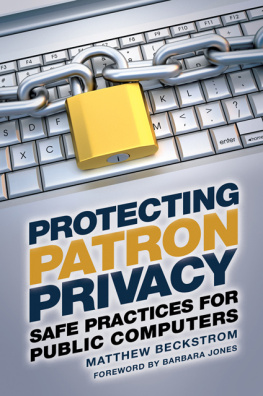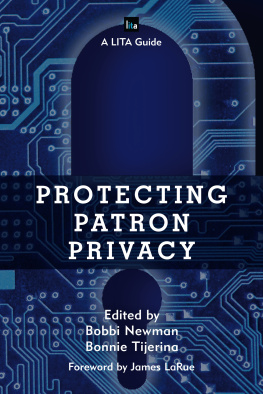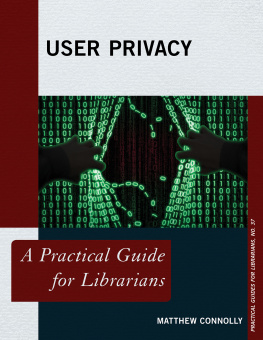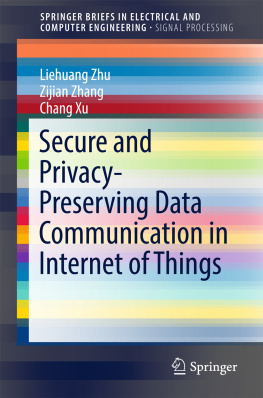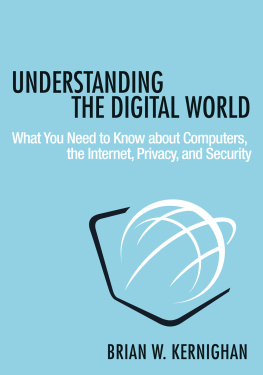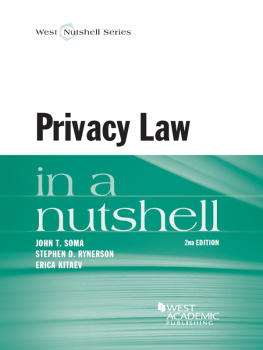

Copyright 2015 by ABC-CLIO, LLC
All rights reserved. No part of this publication may be reproduced, stored in a retrieval system, or transmitted, in any form or by any means, electronic, mechanical, photocopying, recording, or otherwise, except for the inclusion of brief quotations in a review, without prior permission in writing from the publisher.
Library of Congress Cataloging-in-Publication Data
Beckstrom, Matthew.
Protecting patron privacy : safe practices for public computers / Matthew Beckstrom ; foreword by Barbara Jones.
pages cm
Includes bibliographical references and index.
ISBN 978-1-61069-996-9 (pbk : alk. paper) ISBN 978-1-61069-997-6 (ebook) 1. Public access computers in librariesUnited States. 2. Internet access for library usersUnited States. 3. Privacy, Right ofUnited States. 4. InternetSecurity measures. 5. Data protection.
I. Title.
Z678.93.P83B43 2015
025.50285dc23 2015004049
ISBN: 978-1-61069-996-9
EISBN: 978-1-61069-997-6
19 18 17 16 15 1 2 3 4 5
This book is also available on the World Wide Web as an eBook.
Visit www.abc-clio.com for details.
Libraries Unlimited
An Imprint of ABC-CLIO, LLC
ABC-CLIO, LLC
130 Cremona Drive, P.O. Box 1911
Santa Barbara, California 93116-1911
This book is printed on acid-free paper 
Manufactured in the United States of America
Images of Microsoft products are used with permission from Microsoft.
Images of Google products and the Google logo are registered trademarks of Google Inc., used with permission.
This book is dedicated to my family.
Contents
Foreword
The past decade has witnessed a sea change in the way librarians view one of the professions most time-honored ethical principles and legal mandates: privacy. Matt Beckstrom clearly brings the origins of library privacy best practices into the twenty-first centuryfrom protecting the freedom to read books privately, to the understanding of how cookies function to invade that right. The same technology that creates our vibrant information society also has the potential to chill it.
This book is special because Beckstrom provides the mechanics of how the Internet works with servers, with the Web, with operating systemsand where potential privacy breaches lurk. How the Windows operating system protects some privacy but not all, and what librarians can do to improve patron privacy. I am delighted that finally we have a book that tells it in plain language for those among us who are not techies. As Matt says: Understanding how privacy is lost on the Internet is the first step to helping secure it. And he tells us how to educate library staff and patrons to ensure the best possible privacy protection.
This book gives an excellent account of how libraries take the idealism of the Code of Ethics and the Library Bill of Rights and tells librarians and patrons how to take action to make it real. The economic pressure on governments and business to collect big data for economic gain is tremendous. At the same time, legislatures and the courts are responding to public pressure to protect our privacy. This dynamic environment means that all library workers and advocates need to be current on the impact of privacy on libraries. This book does that. In addition, Beckstrom cites the American Library Association frequently. The Office for Intellectual Freedom maintains a website: www.chooseprivacyweek.org. It also continues to monitor state library privacy legislation, which has taken some positive steps to include e-privacy. And the IFC Privacy Subcommittee welcomes member involvement.
Constantly updated informationalong with this bookprovide practitioners, decision makers, and the public the tools to choose privacy in our nations libraries.
Barbara M. Jones
Director, Office for Intellectual Freedom
American Library Association
CHAPTER 1
Privacy and How It Is Lost
Privacy
Libraries and Privacy
Privacy is important to everyone. Privacy is something we have come to expect in certain situations, and when it is taken away from us or infringed in some way, we want it back. Imagine sitting in a library reading a book, and someone comes over and leans over your shoulder to see what you are reading. Imagine browsing the bookshelves at the library for books on dieting and having someone following you around trying to sell you diet food. What if an FBI agent was sitting with you, recording your conversation with your mother? We naturally have boundaries with other human beings, and respecting those boundaries is part of a civilized society. What if these same situations happened to you on the Internet? This is what is going on now with the growth and expanded use of the Internet. Companies are recording what we watch and read. Advertisers are recording our behavior and targeting us to make money. Governments are recording and saving everything we do on the Internet. The Internet has also become a breeding ground for individuals attempting to steal personal information or attack computers. We are losing our privacy on the Internet.
Why do we want privacy on the Internet? Should we expect to have any privacy when using the Internet? As mentioned before, it is upsetting to have someone constantly watching what you are doing, especially if they are recording it and using it in ways you have no control over. As we use the Internet, we should be able to control, as best we can, what people and companies see and record us doing.
Libraries have been providing their patrons with a certain level of privacy for many years. It is an official and basic right that libraries grant to their patrons. Just as patients consider their medical records to be private, library patrons expect that their right to view materials and services provided by the library comes with a certain level of privacy regarding what materials or services they have used. In 1939 the American Library Association (ALA) provided a Code of Ethics for Librarians that, in part, affirmed the librarians obligation to treat as confidential any private information obtained through contact with library patrons (American Library Association, 1939). This affirmation obviously was in reference to traditional library services including material checkouts and facility use, but in more recent years it has been extended to include electronic access by patrons as well. The current version of the Code of Ethics, last amended in 2008, adds with respect to information sought or received and resources consulted, borrowed, acquired or transmitted. The American Library Association also has published a Library Bill of Rights that many libraries follow. The Library Bill of Rights states that library users should have free access to all library resources, and that libraries should resist abridgment of free expression and free access to ideas (American Library Association, 1939). The Internet is treated by libraries the same as any collection and is considered part of the resources that they offer. These basic rights granted to library users for access to library resources naturally and rightly extend to the Internet.
Many states ensure privacy rights that cover how patrons utilize the library. Ten states offer privacy rights to their citizens in their state constitutions. The constitutions of Alaska, Arizona, California, Florida, Hawaii, Illinois, Louisiana, Montana, South Carolina, and Washington all have sections devoted to privacy. Forty-eight of the fifty states have laws regarding patrons rights regarding use of public library materials and services. These laws grant library users the right to request and use library materials and services without having that use be made public, without a legal request from a court.
Next page
